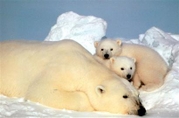Untitled Document
 |
|
This undated photo provided by the U.S. Fish and Wildlife Service shows a sow polar bear resting with her cubs on the pack ice in the Beaufort Sea in northern Alaska. (AP Photo/U.S. Fish and Wild Life Service, Steve Amstrup )
|
Polar bears and hippos are among more than 16,000 species of animals
and plants threatened with global extinction, the World Conservation Union said
Tuesday.
According to the Swiss-based conservation group, known by its acronym IUCN,
the number of species classified as being in serious danger of extinction rose
from about 15,500 in its previous "Red List" report, published in
2004.
The list includes one in three amphibians, a quarter of the world's mammals
and coniferous trees, and one in eight birds, according to a preview of the
2006 Red List. The full report is published later this week.
"Biodiversity loss is increasing, not slowing down," said Achim Steiner,
the conservation group's director general. "The implications of this trend
for the productivity and resilience of ecosystems and the lives and livelihoods
of billions of people who depend on them are far-reaching."
The Red List classifies about 40,000 species according to their risk of extinction
and provides a searchable online database of the results. The total number of
species on the planet is unknown, with 15 million being the most widely accepted
estimate. Up to 1.8 million are known today.
People are the main reason for most species' decline, mainly through habitat
destruction, according to IUCN.
Polar bears are threatened by global warming and melting ice caps, because
they are conditioned for the icy environment and depend on Arctic ice floes
for hunting seas. They are predicted to suffer a 30 percent population decline
in the next 45 years.
The hippopotamus population in war-ravaged Congo, meanwhile, has plummeted
by 95 percent, mainly because of unregulated hunting for meat and ivory in their
teeth.
"Regional conflicts and political instability in some African countries
have created hardship for many of the region's inhabitants, and the impact on
wildlife has been equally devastating," said Jeffrey McNeely, chief scientist
at IUCN.
Freshwater fish have suffered some of the most dramatic population declines
because of human activities that damage their habitat, like forest clearance,
pollution and water extraction. In the Mediterranean, more than half of the
252 endemic species are threatened with extinction. Seven species, including
two relatives of carp, are already extinct, IUCN said.
The conservation union warned that the decline in wetlands and freshwater ecosystems
will also damage supplies for humans of food, clean drinking water and sanitation.
Other species threatened with extinction include desert gazelles, ocean sharks
and Mediterranean flowers, IUCN said.
Some 784 are listed as extinct — only a small increase from 2004 —
while 65 are found only in captivity. But the situation looks a little brighter
for some others, such as the white-tailed eagle and Indian vultures.
"Reversing this trend is possible, as numerous conservation success stories
have proven," Steiner said. "Biodiversity cannot be saved by environmentalists
alone — it must become the responsibility of everyone with the power and
resources to act."
On the Net: http://www.iucnredlist.org

